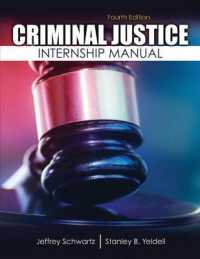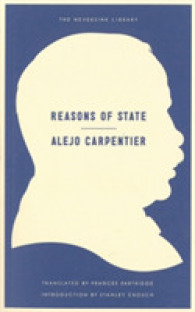- ホーム
- > 洋書
- > 英文書
- > Literary Criticism
Full Description
All of American author Frank Norris's significant critical writings have been compiled in this book, including his articles for the San Francisco Wave during 1896-1897 and selections from his "Weekly Letter" column for the Chicago American in 1901. Essays from these two previously unexploited sources, comprising almost half the book, reveal certain areas of Norris's thought which heretofore had been overlooked by scholars.
This book was compiled in order to clarify Frank Norris's literary creed. When Donald Pizer began to read Norris's uncollected critical articles, he observed concepts which had been unnoted or misunderstood by his critics. Crediting this to the inadequate representation of Norris's ideas in the posthumous The Responsibilities of the Novelist (1903), Pizer recognized the need for an interpretive and complete edition of Norris's critical writings. This volume thus fills a noticeable gap in the field of American literary criticism.
By the time of his death in 1902 Norris had a closed system of critical ideas. This core of ideas, however, is only peripherally related to the conventional concept of literary naturalism, which perhaps explains why critics have gone astray trying to find Zolaesque ideas in Norris's criticism. Norris's central idea, around which he built an aesthetic of the novel, was that the best novel combines an intensely primitivistic subject matter and theme with a highly sophisticated form. His paradox of sophisticated primitivism clarifies the vital link between the fiction produced in the 1890s and that written by Hemingway, Faulkner, and Steinbeck.
Norris's essays deal with many of the literary themes which preoccupy modern critical theorists. His range of subjects includes the form and function of the novel; definitions of naturalism, realism, and romanticism; and the problem of what constitutes an American novel. His interpretation of commonplace events, his comments on prominent figures of his day, and his parodies of writers such as Bret Harte, Stephen Crane, and Rudyard Kipling are characterized by ingenuity and perception. Through these writings the personality of a man with well-defined convictions and the ability to expound them provocatively comes into sharp focus.
In a general introduction Pizer summarizes Norris's critical position and surveys his career as literary critic. This introduction and the interpretative introductions preceding each section constitute an illuminating essay on the literary temper of the period and provide a new insight into Norris' craft and his literary philosophy.
Contents
Preface
Introduction
A Note on Authorship and the Text
Part One: The Writer and His Craft
The Training of the Novelist
Introduction
The "English Courses" of the University of California
Frank Norris' Weekly Letter (June 8, 1901)
Novelists of the Future: The Training They Need
Novelists To Order-While You Wait
"Life, Not Literature"
Introduction
Our Unpopular Novelists: Disappearance of American Fiction from the Book Stores
The Decline of the Magazine Short Story
An Opening for Novelists: Great Opportunities for Fiction Writers in San Francisco
Frank Norris' Weekly Letter (August 24, 1901)
Why Women Should Write the Best Novels: And Why They Don't
New York as a Literary Center
The "Nature" Revival in Literature
The Mechanics of Fiction
Introduction
The Modern Short Story
Fiction Is Selection
Frank Norris' Weekly Letter (July 13, 1901)
A Problem in Fiction: Truth Versus Accuracy
The Mechanics of Fiction
Simplicity in Art
Story-Tellers vs. Novelists
Definitions
Introduction
Zola as a Romantic Writer
Frank Norris' Weekly Letter (August 3, 1901)
A Plea for Romantic Fiction
Part Two: The Writer and Society
The Responsibilities of the Novelist
Introduction
The True Reward of the Novelist
The Need of a Literary Conscience
The Novel with a "Purpose"
The Responsibilities of the Novelist
The Novelist as American
Introduction
"The Literature of the West": A Reply to W. R. Lighton
An American School of Fiction? A Denial
The Frontier Gone at Last
The National Spirit as It Relates to the "Great American Novel"
A Neglected Epic
The Great American Novelist
Popular Fiction
Introduction
The American Public and "Popular" Fiction
Child Stories for Adults
Part Three: The Writer as Businessman
Introduction
The Unknown Author and the Publisher
The "Volunteer Manuscript": Plain Talk to the Ambitious Amateur
Fiction Writing as a Business
Retail Bookseller: Literary Dictator
Newspaper Criticisms and American Fiction
Part Four: Reviews
Introduction
Theory and Reality: An Old Author and a New Writer Consider the Same Problem
Zola's Rome: Modern Papacy as Seen by the Man of the Iron Pen
Stephen Crane's Stories of Life in the Slums: Maggie and George's Mother
A Question of Ideals: The American Girl of 1896 as Seen by Wenzel and by Gibson
Millard's Tales: Pungent Episodes of Western Life, Short and Pointed
Perverted Tales
Frank Norris' Weekly Letter (June 22, 1901)
Frank Norris' Weekly Letter (July 20, 1901)
Mr. Kipling's Kim
Part Five: Salt and Sincerity
Introduction
I (May, 1902)
II (June, 1902)
III (July, 1902)
IV (August, 1902)
V (September, 1902)
VI (October, 1902)
Bibliographical Note
Checklist of Norris' Literary Criticism
Index








